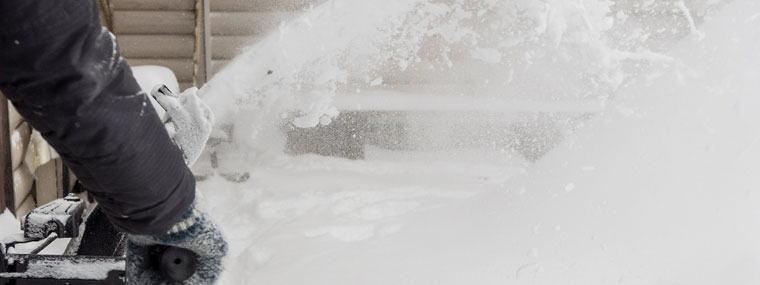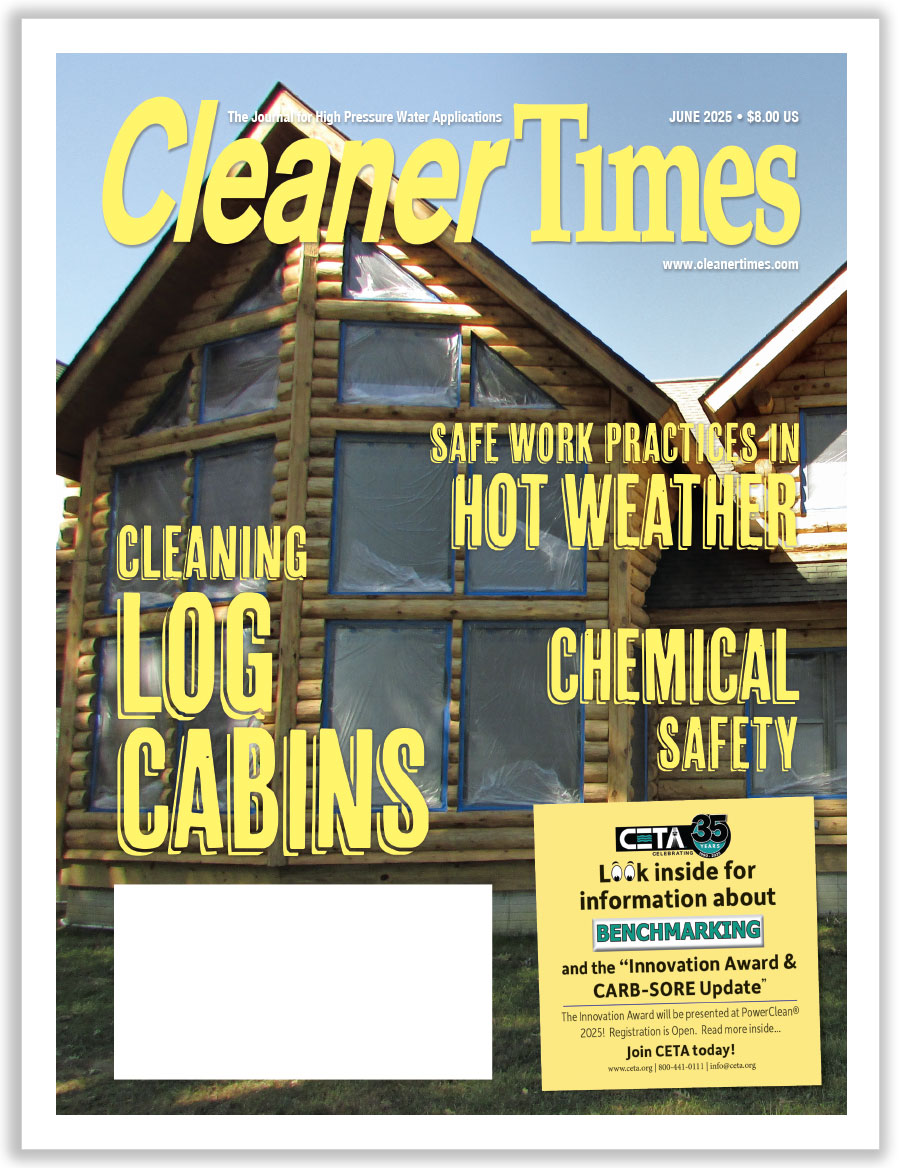
Winterizing Your Home
By Diane M. Calabrese / Published October 2023

Serenity could be looking out on a landscape covered by a new snowfall or not…Winter brings more than picturesque vistas. Its attendant cold, ice, weighty snow, and wind all stir trouble.
Preparation is the best way to avoid the frozen pipes, ice dams, sagging soffits, collapsed roofs, and fallen trees that cast winter in a negative light. The preparation is really part of routine home maintenance, and as such it has much in common with winterizing pressure washers.
In fact, it was “Mi-T-M’s Guide for Winterizing Your Home” (available at the company website, mitm.com) that got this magazine’s editor thinking about the topic. There’s a natural two-part link to pressure washers.
One, pressure washers can help with home winterization. Two, pressure washers themselves must be winterized at latitudes where there is a winter season. (We will return to some specifics about each effort.)
Hannah Burds, marketing project manager at Mi-T-M Corporation in Peosta, IA, took some questions we posed about what might be parallel activities for contractors who own homes and discussed them with members of her team. She responds to our questions on commonalities in the next section.
Commonalities
CT: Should contractors be thinking about winterizing their homes at the same time they are winterizing their pressure washers?
Burds: Winterizing homes and pressure washers should occur during the same time of year. Winterizing your home should come first, while winterizing your pressure washer should be done once your home is fully winterized and your pressure washer is no longer needed until it starts to warm up again.
CT: Are there any similarities between the approach to winterizing a home and the approach to winterizing a pressure washer?
Burds: Similarities would mainly include the time of year winterizing is done. This typically happens in the middle/later months of fall before temperatures drop below freezing. When winterizing your home and your pressure washer, you want to make sure it is done properly in order to extend the longevity of your property and assets.
CT: Are there any similarities between things that can go wrong with failure to winterize a home and with failure to winterize a pressure washer?
Burds: Failing to winterize your pressure washer could result in damage to components due to
freezing water and/or mold and grime buildup. It’s the same with failing to winterize your home, which could result in mold, mildew, and grime buildup.
Both can result in damaged property and/or assets. Making sure both your home and pressure washer are properly winterized will ensure they are ready to go when winter turns to spring.
CT: Is there any role for a pressure washer in the process of winterizing a home?
Burds: Pressure washers play a huge role in the process of winterizing a home. They are used to clean exterior surfaces; remove old/peeling paint; clean out gutters; clean vehicles and equipment; wash decks, garbage cans, and pools; and much more.
Homes (Deploying Pressure Washers)
“Exfoliate” is the term Burds’ company uses to refer to the process of removing contaminants from the exterior of a home. The idea is to remove all manner of wayward things adhering to the surface, including algae, insect remnants, bird droppings, dirt, and stains.
Yes, exfoliation could be done in late winter or early spring. But there are advantages to completing it as part of winter prep. Eliminating the contaminants before winter prevents the organic sorts from getting an early start on growth during winter warmups. Also, the project is completed before the busyness of spring sweeps over the homeowner and contractor.
Painting is another good task to add to the winter preparation list. Taking care of the project when the ambient temperature is not too high and before it’s too cold is another recommendation from Burds’ company.
Gutter cleaning should also be on the winter preparation list for homes. Clean gutters are a must for prevention of ice dam formation. Burds’ company makes a gutter cleaner that can be fitted to a pressure washer and used from the ground level. In other words, no ladders are needed, and safety gets the lift.
Before covering boats or other recreational vehicles for the winter, be sure they are clean as well, recommends Burds’ company. Dealers and the company’s support center can advise about the best cleaners and nozzles. It’s not the sort of match to try to make alone.
Also clean out the fireplace. Burds’ company makes a wet/dry vacuum that can remove ashes. Cleaning is separate from maintenance, and her company strongly recommends getting a chimney professional to do a yearly inspection and complete any necessary repairs.
Consider, too, refurbishing driveways—clean and seal, recommends Burds’ company. And look to decks and fences that should be cleaned. Trash receptacles are also on the list of home items that ought to be cleaned.
With respect to garbage bins, there are probably many of us who wish our neighbors would clean them out on a much more frequent basis than annually. If the odor is not an indicator that a good wash is needed, the thriving maggot population should be.
Burds’ company suggests using a pressure washer (in lieu of brushes, for example) as part of cleaning an inground pool that’s been drained for the winter. Also, sprinkler systems should be cleared with an air compressor so that water does not remain in the pipes.
Finally, there’s the yard maintenance equipment. Do not store it without cleaning it first. Burds’ company recommends using a pressure washer to clean lawn mowers, chainsaws, rakes, etc. Dry everything well before storing.
Homes (General)
There are home winterization tasks beyond those that benefit from the value of a pressure washer. All are part of routine home maintenance, but the approach of winter makes them more imperative.
Check the home heating system. Better still, have it checked by a professional. Make sure vents work properly.
Check smoke and carbon monoxide detectors. The devices should be tested each month and batteries replaced twice a year.
Bolster or repair weather stripping, insulation, and storm windows.
Do not neglect a roof leak. Get it repaired before winter.
Insulate water lines that run near exterior walls. Shut off water to outdoor spigots that are used only in warmer months.
Have sand, ice melt, and shovels ready to go when they are firstneeded. (Don’t plan to join a crush at the store.)
Stock batteries and check flashlights (quantity and condition).
Cover outdoor parts of AC units after doing any required maintenance.
Verify first aid supplies are up to date and present. (Again, serious storms can eliminate the option of running to the store.)
Consider cutting or trimming the tree or limb that looks like it’s going to fall under the weight of the next big snowfall.
A home will be best prepared for winter if certain improvements get made across the year. Anything a homeowner can do to fortify insulation—and add it where it’s needed most—makes a home more comfortable in winter. It also makes the home more tolerable should the power go out. Get some good advice about how to approach insulation at the Energy Saver section of the U.S. Department of Energy (Energy.gov) website.
The Pressure Washer
When a pressure washer has done all its work—on the job and at home—for the year, then it should be winterized for storage. Burds’ company offers a point-by-point procedure (https://www.mitm.com/blog/
winterize-pressure-washer). Other manufacturers offer similar instructions, so choose a source and follow the procedure outlined.
Not only can failure to properly winterize a pressure washer damage it, but the oversight can also lead to excessive pressure and a breach. That breach could injure the operator or others in the area.
A pressure washer and a home should be winterized for the same reasons. Winterization keeps parts in working order, promotes longevity of structures and components, and supports safety.
Who should be thinking about winterizing homes (and pressure washers)? Anyone who works in a region where the temperature will be at or below 32°F for any interval, however short.
Storing a pressure washer without winterizing it is an invitation to trouble caused by condensation or expansion (ice formation). Never play the “last” hand, as in “the last winter was so mild, winterization was unnecessary.”
Just as a homeowner may want to open windows on a mild winter’s day, a contractor may want to take on winter work (when the temperature is 40°F or above). Take on the work, but winterize at the end of each day—just in case—just as the windows would be shut again.
The damage that can result from failure to winterize homes and pressure washers ranges from the nuisance level to the catastrophic.
A frozen pipe that thaws before breaking means nothing more than a disruption to water flow. A pipe that breaks causing a flood is a different matter.
Similarly, a violent rupture of a pump head in a pressure washer effectively ends the life of the machine.





